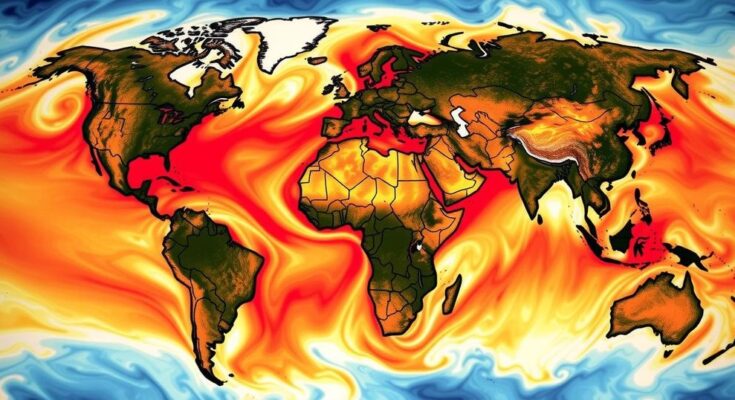In 2024, the Earth recorded its highest temperatures since 1850, with global averages reaching 1.6 degrees Celsius above preindustrial levels. This alarming increase, emphasized by reports from the Copernicus Climate Change Service, has intensified disasters worldwide, notably leading to catastrophic wildfires in Los Angeles. Climate scientists attribute this rise to human-induced factors, urging immediate action to mitigate further climate change.
In 2024, the Earth experienced unprecedented warmth, reaching temperature levels not seen since recordkeeping began in 1850. This surge in global temperatures has raised significant concerns among scientists and policymakers worldwide. The European Union’s Copernicus Climate Change Service reported that the average temperature climbed to 15.10 degrees Celsius (59.18 degrees Fahrenheit), marking an alarming rise of 1.6 degrees Celsius above preindustrial levels. This development overshadows previous warnings, notably those made by UN Secretary-General António Guterres at the COP27 climate conference, emphasizing the urgent need for action to limit temperature increases to 1.5 degrees Celsius by 2100. Unlike the projections made two years prior, the reality now indicates a troubling trajectory for climate stability.
The repercussions of this dramatic temperature rise are evident globally. In particular, residents of Los Angeles faced catastrophic wildfires, resulting in over 9,000 destroyed buildings and at least 10 fatalities. This situation exemplifies how heightened global temperatures facilitate intensified natural disasters, including droughts, hurricanes, and severe flooding. Samantha Burgess, a leading engineer at the European Centre for Medium-Range Weather Forecasts, highlighted the connection between rising temperatures and increased natural disaster severity, noting that “these high global temperatures, coupled with record global atmospheric water vapor levels in 2024, meant unprecedented heatwaves and heavy rainfall events, causing misery for millions of people.” Beyond individual events, the alarming statistic that every year from 2015 to 2024 rank among the ten warmest years documented underscores a pervasive trend of climate change that demands immediate attention.
Furthermore, the report noted that July 22, 2024, set a new record with a global daily temperature of 17.16 degrees Celsius (62.89 degrees Fahrenheit). This year, while Antarctica and Australasia managed to escape the extremes, all other continental regions reported their hottest years to date. The scientific community attributes this alarming climate trajectory primarily to anthropogenic factors, particularly carbon emissions stemming from fossil fuel combustion. The ever-increasing demand for energy, significantly compounded by the energy-intensive requirements of artificial intelligence technologies, poses formidable challenges to mitigating fossil fuel reliance. The current climate landscape necessitates an urgent reassessment of energy consumption and environmental impact, calling for rapid innovation and commitment from global leaders.
The global situation regarding climate change has reached an alarming state as of early 2025, with 2024 being noted as the hottest year on record in over 170 years. Understanding the significance of this temperature rise is crucial, as only two years prior, global leaders underscored the necessity of curbing greenhouse gas emissions to avoid surpassing critical temperature thresholds. The transition to a sustainable energy model is further complicated by increasing demands, including those generated by technological advancements. This pivotal moment requires immediate action to avoid irreversible consequences on our planet.
In summary, 2024 has marked a crucial juncture in global climate history, with temperatures reaching unprecedented levels that were feared to be avoided. The direct correlation between heightened temperatures and increased severity of natural disasters highlights the urgent necessity for global leaders and policymakers to act decisively. As humanity confronts this escalating crisis, it is imperative to develop comprehensive strategies to reduce carbon emissions, transition to sustainable energy, and mitigate the adverse effects of climate change on the environment and society at large. The path forward demands unwavering commitment from all stakeholders to secure a sustainable future for the planet.
Original Source: www.cnet.com




